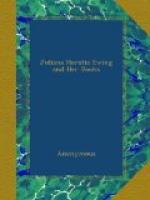The task was thine to mould
and fashion
Life’s plastic
newness into grace;
To make the boyish heart heroic,
And light with
thought the maiden’s face.
* * * * *
O friend! if thought and sense
avail not
To know thee henceforth
as thou art,
That all is well with thee
forever,
I trust the instincts
of my heart.
Thine be the quiet habitations,
Thine the green
pastures, blossom sown,
And smiles of saintly recognition,
As sweet and tender
as thy own.
Thou com’st not from
the hush and shadow
To meet us, but
to thee we come;
With thee we never can be
strangers,
And where thou
art must still be home.
“A Memorial.”—JOHN G. WHITTIER.
JULIANA HORATIA EWING AND HER BOOKS.
PART I.
In Memoriam
JULIANA HORATIA,
SECOND DAUGHTER OF THE
REV. ALFRED GATTY, D.D.,
AND MARGARET, HIS WIFE,
BORN AT ECCLESFIELD, YORKSHIRE, AUGUST
3, 1841,
MARRIED JUNE 1, 1867, TO ALEXANDER
EWING,
MAJOR, A.P.D.,
DIED AT BATH, MAY 13, 1885,
BURIED AT TRULL, SOMERSET, MAY 16,
1885.
I have promised the children to write something for them about their favourite story-teller, Juliana Horatia Ewing, because I am sure they will like to read it.
I well remember how eagerly I devoured the Life of my favourite author, Hans Christian Andersen; how anxious I was to send a subscription to the memorial statue of him, which was placed in the centre of the public Garden at Copenhagen, where children yet play at his feet; and, still further, to send some flowers to his newly-filled grave by the hand of one who, more fortunate than myself, had the chance of visiting the spot.
I think that the point which children will be most anxious to know about Mrs. Ewing is how she wrote her stories. Did she evolve the plots and characters entirely out of her own mind, or were they in any way suggested by the occurrences and people around her?
The best plan of answering such questions will be for me to give a list of her stories in succession as they were written, and to tell, as far as I can, what gave rise to them in my sister’s mind; in doing this we shall find that an outline biography of her will naturally follow. Nearly all her writings first appeared in the pages of Aunt Judy’s Magazine, and as we realize this fact we shall see how close her connection with it was, and cease to wonder that the Magazine should end after her death.
Those who lived with my sister have no difficulty in tracing likenesses between some of the characters in her books, and many whom she met in real life; but let me say, once for all, that she never drew “portraits” of people, and even if some of us now and then caught glimpses of ourselves under the clothing she had robed us in, we only felt ashamed to think how unlike we really were to the glorified beings whom she put before the public.




